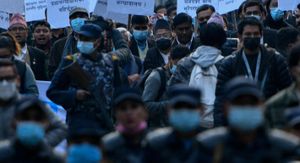On the cusp of President Donald Trump’s anticipated return to the White House, one of the most pressing and contentious aspects of his policy agenda is the mass deportation plan he has promised since his 2016 campaign. This plan, which Trump often touted as the largest deportation effort in American history, has raised serious concerns among immigrant communities and human rights advocates.
One of the cornerstones of Trump’s proposal is to significantly ramp up the deportation of undocumented immigrants. According to reports, Trump plans to focus on criminal noncitizens first, including those accused of more severe crimes. Former ICE director John Fabbricatore, who has been monitoring Trump’s proposals closely, emphasizes the intention behind this strategic focus. “We will go after criminals and national security threats first,” Fabbricatore asserts, indicating the administration aims to alleviate fears of random raids targeting families or individuals without criminal histories.
Yet, many voices, including members of the Denver City Council, are expressing deep anxiety about the potential repercussions of this plan. “There’s an extremely high level of concern,” notes Councilwoman Flor Alvidrez, echoing the distress felt by many residents about their safety and the future of their communities. Even children are caught up in this worry; Alvidrez recounts her son’s fears, questioning, “Is Trump coming to Denver to take away all my new classmates?”
While Trump is focused on deporting specific groups, it remains unclear how his administration will handle those holding Temporary Protected Status (TPS). For many, TPS has provided legal protection and the ability to work when their countries face turmoil. Maribel Hidalgo, who fled Venezuela, is among over 1 million individuals relying on TPS, fearing what would happen if the new administration proceeds to dismantle such protections. “My only hope was TPS,” she expressed, capturing the despair many face as they contemplate returning to dangerous situations.
The timing of Trump's plan coincides with significant shifts within his administration. Key appointments, such as former acting ICE director Thomas Homan as border czar, signal the seriousness and urgency of these deportation plans. Homan, who has previously conducted large-scale deportation efforts under President Barack Obama, openly acknowledges his aims of making family deportations possible. “Families can be deported together,” Homan stated bluntly, reinforcing fears about the administration's approach to enforcement.
While Trump’s proposals pledge to focus regionally and on violent offenders, concerns linger about their broad implementation. Critics argue about the potential for collateral damage—how entire communities could be disrupted as deportations sweep through neighborhoods. Such tactics could lead to workplace raids, echoing painful memories of previous policies under Homan’s earlier tenure.
Concerns also extend beyond immigration enforcement itself. The alarming rhetoric and policy proposals championed by Trump and his advisors have fueled fears of broader societal impacts. Words exchanged between administration officials have indicated sentiments more aligned with fear and division rather than with compassion and community building. This environment raises questions about the value of human dignity—something advocates say should be at the forefront of any immigration discussion.
For many immigrant communities, especially those with legal status, Trump’s proposed changes evoke feelings of insecurity. Mai Xiong, a naturalized citizen and Michigan state representative, shares her fears, indicating how rhetoric from Trump and his inner circle can threaten to pull the rug out from under those who have contributed to society. “These policies make me, and countless others, wonder if we’ll ever truly belong,” she remarks, highlighting how the political climate can directly impact personal identity and community pride.
Trump's rapid changes could particularly impact those who have not only fled oppressive regimes but also contributed significantly to local economies and communities. Many individuals under TPS are integral to the workforce and partake actively within their neighborhoods. The notion of stripping employment opportunities and protections raises not only ethical questions but economic ones as well. “We are more than just undocumented workers,” asserts Vania André, editor of The Haitian Times, underscoring the importance of immigrants beyond their labor contributions.
Trump’s deportation objectives signal to immigrant communities everywhere what they might face. A glimpse of this reality is found through Homan’s assertion, “If you’re not going to help us, get the hell out of the way,” which gives voice to the aggressive stance on state cooperation and collaboration against undocumented immigrants. It’s this aggressive tone and approach, combined with the overall framing of immigrants as problems to be solved, which lies at the heart of the fears permeated within immigrant communities across the United States.
The legal ramifications of these proposed deportations stand to be challenged; courts may become arenas where these policies clash head-on with constitutional rights and established human rights precedents. For now, immigrants and their allies will continue to push back against policies perceived as draconian and damaging to the very fabric of society.
With the backdrop of upcoming court challenges against these policies, advocates like Arulanantham foresee potential legal battles depending on how the Trump administration moves forward. “It’s possible some will recognize the disastrous repercussions of stripping employment authorization for over a million people,” he argues, “but based on history, I wouldn’t count on it.”
It’s within this setting of turmoil, fear, and uncertainty where the broader discussion about immigration continues. What does it mean to be truly American, and how does policy reflect the values and ideals of this nation? Advocates for immigrants demand answers as they navigate these tumultuous times, often filled with anxiety about what the future holds.
At its core, the mass deportation agenda has surfaced multiple queries about immigrant rights, human dignity, and the vision of America moving forward. The call for unity and proactive collaboration among communities of all backgrounds is more needed now than ever as anxieties swirl and the fight for rights persists amid possible widespread changes felt across the United States. Voices striving for inclusion and opportunity are standing firm, hoping their pleas for compassion resonate amid the policies of division.



